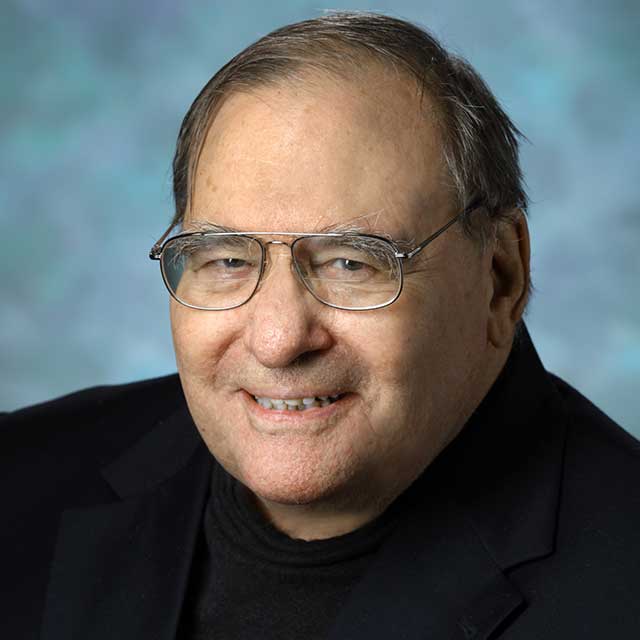In Memoriam: Guy McKhann
Guy McKhann, world-renowned brain scientist and founding director of the Johns Hopkins Department of Neurology, dies at 91

Guy McKhann, a world-renowned brain scientist and founding director of the Johns Hopkins Department of Neurology who mentored three generations of leaders in academic neurology around the world, died April 12, 2023 at age 91. His health had recently declined after a series of small strokes.
In the late 1960s, when Dr. McKhann arrived at Johns Hopkins in Baltimore to establish and chair the neurology department, hospitals rarely had separate departments focused on the brain. He recruited brilliant young physicians with the goal of improving the treatment of common nervous system disorders such as Alzheimer’s disease, stroke, brain cancer and multiple sclerosis.
Dr. McKhann foresaw that brain imaging and neuroscience would transform neurology from primarily a diagnostic field to one that would offer patients new and effective treatments. The department would use brain research to advance patient care and train physicians to use research to inform treatment. He built a department that consistently ranked among the best in the country and the world. Under his leadership, Johns Hopkins teams discovered the scientific basis for many now common therapies, such as deep brain stimulation for Parkinson’s disease, the ketogenic diet for epilepsy and the use of botulinum toxin for many conditions.
His accomplishments in neurology were both broad and deep, leading to changes in practice that continue today. These achievements include important contributions regarding the pathogenesis and treatment of Guillain-Barré syndrome, defining the criteria for diagnosing Alzheimer’s disease and studying the cognitive changes after coronary artery bypass grafting. Additionally, he established a postdoctoral training program that is considered among the country’s finest. His trainees fanned out nationally and internationally as leaders of modern neurology.
After chairing the neurology department for 20 years, Dr. McKhann went on to found and chair the Zanvyl Krieger Mind/Brain Institute at Johns Hopkins to address one of the great mysteries of science: how the brain processes information about the world to generate perception, knowledge, memory, decision and action. He then served for two years as the clinical director of the National Institute of Neurological Diseases and Stroke at the National Institutes of Health.
For more than 30 years, Dr. McKhann was the senior scientific adviser to the Dana Foundation, which established Brain Awareness Week and united neuroscientists around the world in communicating the importance of brain science to the public.
In his own research, Dr. McKhann was equally influential. The “McKhann Criteria” that he established for diagnosing Alzheimer’s disease has been in use for 40 years, and it created the common framework for Alzheimer’s research that is shared by investigators around the world. Dr. McKhann received a Lifetime Achievement Award from the Alzheimer’s Association in 2020.
Dr. McKhann led a team that identified new treatments for adult Guillain-Barré syndrome and discovered a new pediatric form of the disease that was paralyzing children globally. When Dr. McKhann arrived in China in 1990, he found hospital wards full of paralyzed children with family members by their bedside, manually operating respirators 24 hours per day to keep their children alive. He and his international team identified the cause of the disease and created preventive treatments. For this work, Dr. McKhann received an honorary medical degree from Hebei Medical University in China.
Arthur Asbury, a member of his research team, and chairman of neurology and subsequent dean of the University of Pennsylvania’s school of medicine, described the collaboration as “one of the most compelling examples of the power of interdisciplinary research … to advance scientific understanding of human disease.”
For patients having a coronary bypass, Dr. McKhann showed that cognitive impairment following surgery generally was temporary and reversible, lasting no more than three months, and that long-term memory loss and cognitive problems were primarily due to underlying coronary artery disease — not to aftereffects from the use of a heart-lung machine during bypass operations. Dr. McKhann had considerable expertise in the profound ethical dilemmas surrounding brain death and was a senior adviser to the Vatican on this important topic in the 1990s.
Together with his wife, Dr. Marilyn Albert, a professor of neurology and director of the Division of Cognitive Neuroscience at Johns Hopkins, he co-authored the 2002 book Keep Your Brain Young: The Complete Guide to Physical and Emotional Health and Longevity. The Wall Street Journal said the book was “for seniors-in-waiting, as well as the geriatric set … what doctors Spock and Brazelton were to our early parenting years.”
Dr. McKhann attended Harvard University and the Yale School of Medicine. He completed his residency in neurology at Massachusetts General Hospital, and then served in the U.S. Public Health Service at the National Institutes of Health for three years. He was recruited to Johns Hopkins in 1969 at age 37 to found the neurology department.
He was elected to the Institute of Medicine at the National Academies of Sciences, Engineering and Medicine, the American Association for the Advancement of Science and the Royal College of Physicians in the U.K. He served as president of the American Neurological Association and chairman of the Scientific Advisory Group for United Cerebral Palsy.
A lifelong sailor, Dr. McKhann competed around the world with National Sailing Hall of Fame legend Stuart Walker. Together, they won the U.S. championship, placed second in Olympic trials and competed in the Pan American Games. With his family, he sailed transatlantic twice in a 40-foot sailboat.
Dr. McKhann was born in Boston in 1932. His grandfather was a country doctor in Ohio, and both of his parents were professors of pediatrics.
In addition to Dr. Albert, his wife of 26 years, survivors include his children Ian (Zena Bernstein), Emily (Andy Cooper), Guy II (Teri Hartman) and Chas (Fei Wong McKhann), stepchildren Josh Albert (Amelia Albert) and Katie Albert Bolton (William Bolton), and nine grandchildren. His son James died in 2021
